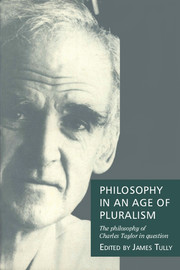Book contents
- Frontmatter
- Contents
- Notes on the contributors
- Preface
- Acknowledgements
- Introduction
- Part I Foundations
- Part II Interpreting modernity
- Part III Natural and human sciences
- Part IV Philosophy in practice
- 8 Literature: Romantic expression or strategic interaction?
- 9 The role of articulation in understanding practice and experience as sources of knowledge in clinical nursing
- Part V Ethics, politics and pluralism
- Part VI Reply and re-articulation
- Bibliography of the works of Charles Taylor
- Index
9 - The role of articulation in understanding practice and experience as sources of knowledge in clinical nursing
Published online by Cambridge University Press: 05 June 2012
- Frontmatter
- Contents
- Notes on the contributors
- Preface
- Acknowledgements
- Introduction
- Part I Foundations
- Part II Interpreting modernity
- Part III Natural and human sciences
- Part IV Philosophy in practice
- 8 Literature: Romantic expression or strategic interaction?
- 9 The role of articulation in understanding practice and experience as sources of knowledge in clinical nursing
- Part V Ethics, politics and pluralism
- Part VI Reply and re-articulation
- Bibliography of the works of Charles Taylor
- Index
Summary
Both the manner and content of Charles Taylor's writings and lectures have shaped my research in nursing. Taylor's effective critique of the narrow theory-bound nature of the social sciences and his explication and defence of interpretive phenomenology for the human sciences provide the content that guides my examination of the knowledge embedded in nursing practice, and the experiences of suffering and comfort as central to that practice. His writings and lectures provide a dialogical manner imbued with an ethic of listening, and respectful articulation of self and other. His view of practical reasoning as involving the enabling transition toward increasingly perspicuous interpretive stances, and his phenomenological understanding of the experience of gain, and of liberation from impediments to action to which such transitions give rise, provide an accurate account of a practice-based ground for knowing similar to the practical, engaged reasoning characteristic of clinical nursing practice:
Practical reasoning … is a reasoning in transitions. It aims to establish, not that some position is correct absolutely, but rather that some position is superior to some other. It is concerned, covertly or openly, implicitly or explicitly, with comparative propositions. We show one of these comparative claims to be well founded when we can show that the move from A to B constitutes a gain epistemically. This is something we do when we show, for instance, that we get from A to B by identifying and resolving a contradiction in A or a confusion which A screened out, or something of the sort. […]
- Type
- Chapter
- Information
- Philosophy in an Age of PluralismThe Philosophy of Charles Taylor in Question, pp. 136 - 156Publisher: Cambridge University PressPrint publication year: 1994
- 41
- Cited by



